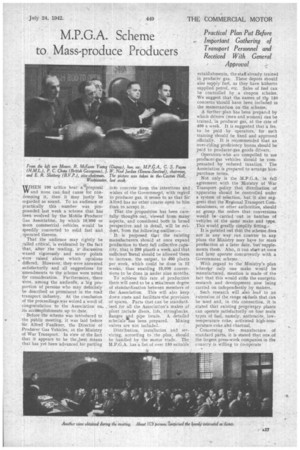M.P.G.A. Scheme
Page 29

If you've noticed an error in this article please click here to report it so we can fix it.
to Mass-produce Producers
Practical Plan Put Before Important Gathering of Transport Personnel and Received With General Approval
WHEN 100 critics hear a liproposal and none can find cause for condemning it, then it may justly be regarded as sound. To an audience of practically this number was propounded last week a scheme that has been evolved by the Mobile Prochicer Gas Association, by which 10;000 or more commercial vehicles would be speedily converted to solid fuel and operated thereon.
That the audience may rightly be called critical, is evideneed by the fact -that, after the reading, adiscussion waxed vigorously and many points were raised about which opinions differed. However, they were answered satisfactorily and all suggestions for amendments to the scheme were noted for consideration. Furthermore, there were, among the audiente, a big proportion of persons who may definitely be described as prominent in the road transport industry. At the conclusion of the proceeding&was voiced a word of congratulation to the Association on. its accomplishments up to date.
• Before the scheme was introduced to the public meeting, it was laid before Sir Alfred Faulkner, the Director of Producer Gas Vehicles, at the Ministry of War Transport. In view of the fact that it appears to be the.,,best means that has yet been advanced for putting into concrete form the intentions a,nd wishes of the Gov'ernmept, with reghrd to producer gas, it seems to us that Sir Alfred has no other course open to him than to accept it.
That the proposition has been carefully thought, out, viewed from many aspects,, and considered both in broad perspective and in detail, will be evidept, from the following outline:—
It is proposed that the existing manufacturers should at once expand production to their full collective capacity, that is 200 plant a week, and that sufficient 'fnetal should be allowed them to increase, the output, to 400 plants per week, which could be done in 12 weeks, thus enabling 10,000 conversions to be done in under nine months.
To achieve this rate of production there will need to be a maximum degree of standardization between members of the Association. This will also keep down costs and facilitate-the provision of spares, Parts that can be standardized for all the Association's makes of plant include doors, lids, strongbacks, flanges id pipe bends. A detailed sched,uleTha,s been prepared. Mixing valves are not included.
Distribution, installation, and servicing, according to the plan, should be handled by the motor trade. The M.P.G.A. has a list of over 150 suitable
establishments, the staff already trained in producer gas. These depots should also supply fuel, as they have hitherto supplied petrol, etc. Sales of fuel can be controlled by a coupon scheme. We suggest that the names of th‘v 150 concerns 'should have been included in the memorandum on the scheme.
A further plan has been prepand by which drivers (men and women) can be trained, in producer gas, at the rate of 400 a week. It is suggested that I lee, to be paid by operators, for such training should be fixed and approved officially. It is recommended that an over-riding proficiency bonus should be' paid to producer-gas goods drivers.
Operators who are compelled to use producer-gas vehicles should be compensated by reduced taxation. The Association is prepared to arrange hirepurchase terms.
Not only is the M.P.G.A. in full agreement with the Ministry of War Transport policy that distribution of apparatus should be controlled under a system of selection, but it also sug-gests that the Regional Transport Commissioners, or other authorities, should so group the orders that conversions would be carried out in batches of vehicles of the same make and type. This would greatly simplify fitting, •
It is pointed out that the scheme, does not in any way run counter to any plans the Ministry may have for mass production at a later date, but' supplements them. Also, it can start at once and later operate concurrently with a C;overninent scheme.
With ,regard to the Ministry's plan "Whereloy only one make would be manufactured, mention is made of the fact that this would stifle the energetic research and development now being carried on independently by makers.
Such research will also lead to an extension of the range ofrfuels that can be used and, in this connection, it is stated that existing proprietvy plants can operate satisfactorily on four main types of fuel, namely, anthracite, lowtemperature coke, activated high-temperature coke atrd charcoal,
Concerning the manufacture of standard parts, it is stated that one of the largest press-work companies in the country is willing to co-operate •




















































